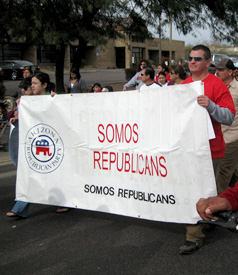CHICAGO — Traitor. Sellout. Lino (Latino in name only). These are some of the epithets Latino Republicans are called by fellow Hispanics who can’t imagine why any self-respecting descendant of Latin American immigrants would ever carry water for the Republican Party.
Sadly, the stereotype of the monolithic Hispanic community lives not only in the minds of non-Latinos who are unfamiliar with the cornucopia of Latin American countries — and their political histories — to which the U.S. Hispanic community traces its roots. It is also alive and well in the minds of Latinos who can’t stomach the idea that one of their own could be associated with a party they believe promotes anti-immigrant and anti-Latino sentiments.
Of course there’s no shame in upholding the conservative, family oriented, business-friendly values held dear by the party of Lincoln and Reagan. But outside the state of Florida, the term Latino Republican is an oxymoron to many. Hispanics may be a growing portion of the party that in January will boast two Latino governors, a U.S. senator and several U.S. representatives, but they walk a cultural tightrope daily.
“I go out into the community to do outreach and people ask me, ‘How in the heck can you be a Hispanic Republican?'” said DeeDee Garcia Blase, a Gulf War veteran and founder of the Arizona-based Somos Republicans — “We are Republicans” — a national organization seeking to increase the number of Latinos voting for Republican candidates. “I explain to them that I’m pro-life, believe in less government, and many listen but Latino liberals are the ones who give me the hardest time. They just don’t get it, they hate me, they say, ‘You’re crazy.'”
Tony Hernandez, a small-business owner who last month lost his bid for a Minnesota state Senate seat, has learned to politely defuse the sparks that come along with being a Republican living in a part of St. Paul where his Latino neighbors are almost all Democrats. “It’s a very, very difficult issue,” he said. “I remember my cousin’s second birthday, it was probably four months into my campaign and I saw my grandpa’s compadre who has always been warm to me. He looks at me and says, ‘Oh, you’re the Republican politician.’ That’s how it is and it can be tough, but I get defensive in a positive way. We are the party of economic opportunity, we want people to live independently in a free society. Some people understand that and other people just can’t.”
Both Blase and Hernandez say the real difficulty is in getting people to look past the headlines and the rhetoric the Republicans have spouted about immigrants, especially Hispanic ones. “I think the party is failing on the message-delivery part,” Hernandez said. “Overall they need to be more sensitive. I don’t like to hear our leaders call the undocumented ‘illegals’ or talk about immigration issues with knee-jerk reactions or a police-type mentality like what you’re seeing in Arizona. That’s not going to attract a good, solid Latino following.”
Blase, who describes herself as living at “ground zero” of the illegal immigration debate, says she just can’t stand Arizona Republican leaders freely using terms like “wetbacks,” “anchor babies,” “illegals.”
“It’s very difficult for me. I have to remind Hispanics that the majority of Republicans are not this way.”
Ruben D. Sanchez Jr., a Chicago flight attendant and self-described triple-whammy — “I’m Latino, gay and a Sarah Palin-loving tea party Republican” — echoed those sentiments. “There are some people in the party who oppose illegal immigration for other than national security reasons. They like to talk big and make a lot of noise but those people are mostly shunned by the party,” Sanchez said. “The media paints them as representative of most Republicans instead of focusing on our commitment to freedom of economic opportunity.”
Of all the uphill battles Latino Republicans face, their biggest one may be the GOP itself. Both Blase and Hernandez said they’ve so far been discouraged or ignored by their state-level party organizations, and neither they nor Sanchez sees any evidence that the national organization is preparing to reach out to Latinos in any meaningful way. What a shame.
If Republicans want Latinos to help them meet their stated objective of reclaiming the White House in 2012, they need to cultivate these passionate advocates before their spirits are ground down by the party’s indifference and well-publicized rhetoric.
Esther Cepeda’s e-mail address is estherjcepeda(at)washpost.com.
(c) 2010, Washington Post Writers Group
Media that fights fascism
Truthout is funded almost entirely by readers — that’s why we can speak truth to power and cut against the mainstream narrative. But independent journalists at Truthout face mounting political repression under Trump.
We rely on your support to survive McCarthyist censorship. Please make a tax-deductible one-time or monthly donation.
